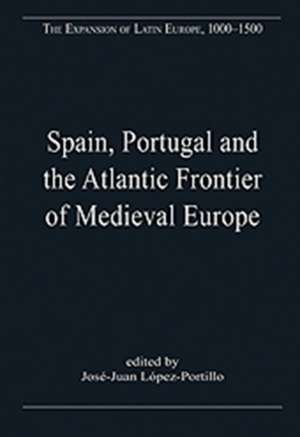Spain, Portugal and the Atlantic Frontier of Medieval Europe: The Expansion of Latin Europe, 1000-1500
Autor Jose-Juan Lopez-Portilloen Limba Engleză Hardback – 18 oct 2013
Preț: 1219.34 lei
Preț vechi: 1636.05 lei
-25% Nou
Puncte Express: 1829
Preț estimativ în valută:
233.36€ • 241.77$ • 194.75£
233.36€ • 241.77$ • 194.75£
Comandă specială
Livrare economică 28 februarie-14 martie
Doresc să fiu notificat când acest titlu va fi disponibil:
Se trimite...
Preluare comenzi: 021 569.72.76
Specificații
ISBN-13: 9781409454953
ISBN-10: 1409454959
Pagini: 414
Dimensiuni: 174 x 246 x 31 mm
Greutate: 1 kg
Ediția:1
Editura: Taylor & Francis
Colecția Routledge
Seria The Expansion of Latin Europe, 1000-1500
Locul publicării:Oxford, United Kingdom
ISBN-10: 1409454959
Pagini: 414
Dimensiuni: 174 x 246 x 31 mm
Greutate: 1 kg
Ediția:1
Editura: Taylor & Francis
Colecția Routledge
Seria The Expansion of Latin Europe, 1000-1500
Locul publicării:Oxford, United Kingdom
Cuprins
Contents: Contents: Introduction; Bibliography; Part I The Background: The expedition of the brothers Vivaldi: new archival evidence, Jill Moore; The role of the Italian merchant class in Renaissance and discoveries, Thomas Goldstein; The origins of the European Atlantic, Felipe Fernández-Armesto. Part II Peninsular Reconquests: The survival of a notion of Reconquista in late 10th- and 11th-century León, Felipe Fernández-Armesto; Reconquest and crusade in Spain c.1050-1150, R.A. Fletcher; The frontier and Castilian liberties, Claudio Sánchez Albornoz; Trading with the ‘other’: economic exchanges between Jews, Muslims, and Christians in late medieval northern Castile, Teofilo F. Ruiz; From the Reconquista to Portugal Islâmico: Islamic heritage in the shifting discourses of Portuguese historiography and national identity, Abdoolkarim Vakil; The Reconquest as crusade in the anonymous De expugatione Lyxbonensi, Stephen Lay. Part III The Castilian Ocean: The Atlantic islands and the development of southern Castile at the turn of the 15th century, Carlos-Alberto Campos; Castile, Portugal and the Canary Islands: claims and counterclaims, 1344-1479, Joseph F. O’Callaghan; An ecohistory of the Canary islands: a precursor of European colonialization in the New World and Australia, Alfred W. Crosby. Part IV The Portuguese Ocean: White kings on black kings: Rui de Pina and the problem of black African sovereignty, P.E. Russell; Prince Henry the Navigator: the rise and fall of a culture hero, P.E. Russell; Before Columbus: Portugal’s African prelude to the Middle Passage and contribution to discourse on race and slavery, A.J.R. Russell-Wood; Slavery and slaving in the Portuguese Atlantic (to about 1500), Anthony Luttrell; Feudal and demesnial forms of Portuguese colonization in the Atlantic zone in the 14th and 15th centuries, especially under Henry the Navigator, Charles Verlinden; The settlement of Madeira and the sugar cane plantations, Virginia Rau; How the South was won - and how Portuguese discoveries began, P.E.H. Hair; Index.
Recenzii
'There is much to admire in this collection of essays. Readers of this Journal will find in it a multifaceted, stimulating and useful account of Iberian expansion into the Atlantic in the fifteenth century.' International Journal of Maritime History
Descriere
As seen from the perspective of 1492, the medieval expansion of Latin Europe was not nearly as dramatic or enduring as in the Iberian Peninsula and the Atlantic. Castile and Portugal also transformed the Atlantic Ocean from the inaccessible dead-end of Eurasia into the most promising avenue for European expansion. The articles collected here investigate the extent to which the ’transference’ of Mediterranean traditions aided this process; the characteristics of Iberian conflict that eventually led to the success of its Christian kingdoms; and the motives for launching, and techniques for running, the first European ’overseas empires’ in the Atlantic frontier. In the process they illuminate the new identities and cultural interactions that this expansion produced in its wake, while the new introduction sets them in the broader context.











